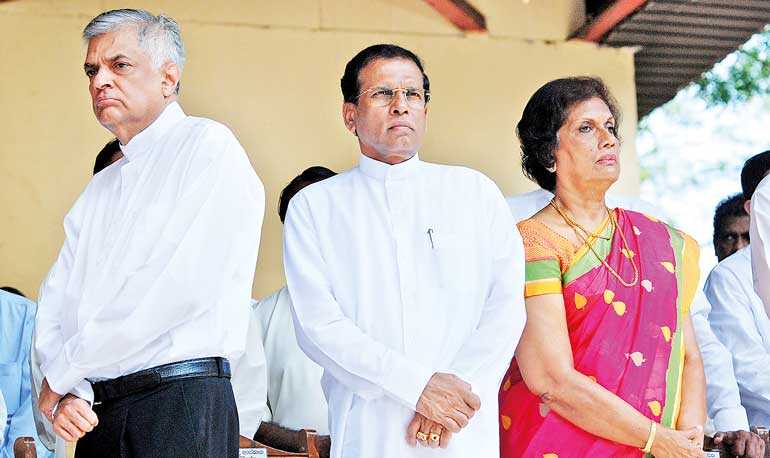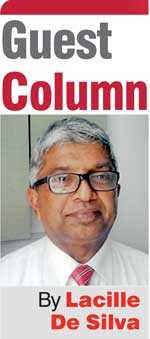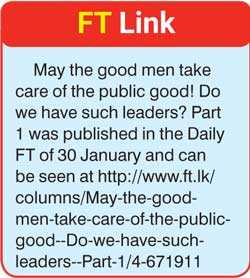Sunday Feb 22, 2026
Sunday Feb 22, 2026
Tuesday, 5 February 2019 00:00 - - {{hitsCtrl.values.hits}}

The President during his presidential election campaignhad stated: “I will achieve for the country 10 times the development that actually occurred during the past six years only by preventing mega corruption and wastage that existed in the country and provide relief to the people.”
He had further emphasised: “I will expose to the country the true state of the loans.Irregularities in obtaining and managing loans will be rectified. Also urgent steps will be taken to lighten the State debt burden.”
The President at a meeting recentlyhadsaid that he was fully well aware of what was happeningin ministries,departments and other institutions coming under his Government and added that he was unable to clean up the mess, for reasons well known to him. He regretted that he was unable to reveal all that until he ceased to be the President.
 I recall both CBK and MR too said similar things. CBK accused a senior minister, without mentioning the name, saying that in her Cabinet a certain minister was the biggest rogue. This accusation was made ata meeting where a team of IMF officials including Jeremy Carter, a top official from Washington, and the Resident Representative NadeemUlHaq, were present. It was thereafter revealed that a sum of Rs.43 million was found in a lockerwhich had belonged to the relevant minister.It also had been reported that these monies had not been duly declared in the declaration of assets, which is a legal requirement in the country.
I recall both CBK and MR too said similar things. CBK accused a senior minister, without mentioning the name, saying that in her Cabinet a certain minister was the biggest rogue. This accusation was made ata meeting where a team of IMF officials including Jeremy Carter, a top official from Washington, and the Resident Representative NadeemUlHaq, were present. It was thereafter revealed that a sum of Rs.43 million was found in a lockerwhich had belonged to the relevant minister.It also had been reported that these monies had not been duly declared in the declaration of assets, which is a legal requirement in the country.
Minister Ravi Karunanayake recently warned that the country was bankrupt and heading for disaster.According to one economist,“Persistent shortfalls in growth rates compared to comparable countries provides prima facie evidence of State failure and its severity.” If so,who is responsible for creating an ungovernable Sri Lanka?According to Michael Ignatieff, there are several causes such as maladministration, interference, and abandoning power and authority.
MS Government has done nothing substantial
The MS Government was elected to power with the specific task of managingand seeking solutions for an acute economic and financial crisis facing the country. They have already wasted four years – and nothing substantial has been done todate.
As pointed out by William Reno, in Sri Lanka,Elected Political Executives (EPEs) have created a framework of rule outside formal State institutions, a shadow of State bureaucratic agencies based on personal ties to make the lives of the populationless secure and more materially impoverished, since all that encourages poor voters to seek the EPE’s personal favour to secure exemption from these conditions.
Given the grave consequences, the Government has a responsibility to prevent further chaos. Nevertheless, it has apparently disregarded all that and sent a letter to the Secretary-General of Parliament to take up the letter in Parliament to form a national government once again. This is a crime!
Failed states
Robert Rothberg, who specialises in failed states, two decades agohad raised the question why Sri Lanka, in spite of separatist war and widespread insecurity, had not joined the failed states bandwagon.He had said that it was because Sri Lanka had been fortunate to hold regular elections and its ability to continue to deliver basic legitimate functions.
Does that mean if Sri Lanka had managed to deliver these basic functions,it can never be pushed to the status of a failed state in keeping with the predictions of RK?Could it be some unforeseen miraculous power protecting this country?
 Why did this Government eventually change the cabinet portfolios on several occasions?Surelyit ispurely to overcome difficult situations? In the current context, portfolios are allocated not to enhance performance but as a tool to obtain support of other parties in coalitions in Parliament, which is enticement.That is exactly what MR did after having ended the war.
Why did this Government eventually change the cabinet portfolios on several occasions?Surelyit ispurely to overcome difficult situations? In the current context, portfolios are allocated not to enhance performance but as a tool to obtain support of other parties in coalitions in Parliament, which is enticement.That is exactly what MR did after having ended the war.
Government in a dilemma
The MS/RW combination too so far has disregarded the requirements: to serve the citizens; pursue public interest;value citizenship; think strategically while acting democratically; recognise that accountability is always honoured; serve with passion; and being compassionate to people not just productivity.
The present Government having promised baskets ofgoodies to the people at the elections, now appears to be in a dilemma not knowing how to run good governance.The President and the Prime Minister are therefore miserable failures.
Professor Gerard Caiden of the University of Southern California had pointed out that owing to multiplicity and complexity of changes taking place globally, citizens require effective and efficient governments, with good leadership as never before.
Techno-bureaucratic governance with public service professionalism is fundamental in contemporary public service with certain crucial requirements such as: rule of law; providing most essential public goods; ensuring public responsibility and accountability; setting an example at the top; improving both meritocracy and service delivery with professionalism; and promoting and honouring democratic principles of governance.
Rent-seeking politicos
It is sad that the MS/RW Government does not have any clue at all about the need and its role at the top how to formulate and introduce strategic policies and methods to (re)invent the ramshackle institutions including Parliament to move from routine administrationto that of development planning and management. Over the past few decades, rent-seeking politicos have totally destroyed the values of the public service having sacrificed meritocracy for expediency and opportunism.
I must add many decades ago, we had a public administration system considered to be one of the best in developing countries. Our rulers were thereafter unsuccessful in exploiting development challenges and opportunitiesto take the country forwardin post-independent Sri Lanka. I have no doubt, unlike Malaysia, Singapore, Indonesia, our leaders missed the bus, having disregarded their bigger roles and proved piteously unsuccessful.
Theyhad willingly given up their legitimate role even after ending the war. It is all because they practice everything against the norms. The elected political executives – the President, Prime Minister and the Cabinet Ministers– are only expected to make laws and policies and bureaucrats should take orders from the political executives for the implementation of the policies formulated by them to run ethical and moral governance. An EPE should have the courage and the confidence to make tough decisionswithout inflicting pain and misery.
The officials of the Department of Customs have launched trade union action as a mark of protest against the removal of P.S.M. Charles,Director-General customs, by the Ministry of Finance. The strikers say that the transfer was unjust and that this is the fourth officer to be replaced during the last four years. This is the first time in contemporary Sri Lanka that a trade union has come forward to fight on principles to defend their service demanding that the Government should not resort to unethical governance.
UNP has not learnt the lesson
It is good proof that the UNP too has not learnt the lesson that abusing power could be lethal. Elected Political Executives (EPEs) must understand that “an efficient, capable, disciplined, professional, skilled and relatively autonomous bureaucracy, driven by a nationalistic political elite that privileges economic development”.
Our public service has been described as corrupt, inefficient, and a big drain on the economy. EPEs do not introduce measures to arrest the performance failure, the public service delivery and have virtually defied all approaches towards tackling the problem of bribery, corruption, inefficiency, disregard to ethics, morality, etc., and capacity collapse. I must add that the PM had said that the “Black Media”is growing. How is it that he pretends he has not seen that corruption or “Black Market” bureaucracy and other counter-productive attitudes are flourishing right under his nose?
If this country needs to prosper, we need to create a public servicewhere the EPEs should allow the public officers to run their organisations independently, with efficiency and effectiveness.Nevertheless, when it comes to policies, that is where the EPEs becomeanswerable and accountableto the Parliament and their constituencies.Good governance therefore requires separation of the political functions from the administrative areas. It is however very important that both EPEs and bureaucrats need each other and neither can succeed without the other.
This underlines the need to ascertain the deficiencies urgently in the current governance system. Weshould develop methods and devise strategies to strengthen the capacities of both EPEs and public officers to overcome weak and undemocratic governance. I have no doubt the injustices perpetrated continually by elected governments forced the youth in the north and the south to launch rebellions, take up arms and to throw elected governments out of power.
A time-bomb
The weakening of State institutionsthereafter by successive governments had increased violent conflicts in the country several ways islandwide. Jack Snyder has argued that in weak states ethnic concepts of nationalism or other exclusionary ideologies such as religious fundamentalism are more likely to prevail for regional leaders to exploit the power vacuum.The objective of rationalising the governance system is the most crucial step at this juncture.
Ours is at presenta country with explosive-type State commitmentsand liabilities–atime bomb. Due to corrupt self-centred affairs of immoral politicians, who valued filling their own pockets, more than the lives of innocent citizens, for several decades, new publicmanagement practices (NPM) have been long over-due.
We need to establish humane governance.Our aim should be to enhance transparency, accountability, equity and quality of service processes realised by the means of market-oriented public services, citizen participation, realistic decentralisation, out-sourcing, cost-reduction practices, and meritocracy-based good HRM policies as a top-most priority matter. Lip-service alone is not good enough. The country does not need leaders and bureaucrats who only swallows up everything. Our country is endemically corrupt and lacks discipline and often connotes waywardness or turbulence of behaviour. Simply,it looks ungovernable.The President says he fears acts of revolt if he does the right thing – a sad let-down. It is all because all the elected representatives, parliamentarians, cabinet ministers, non-cabinet ministers, deputy ministers, provincial councillors, local level politicos, including public officers are all strictly profit-driven. They are all not driven to serve the best interests of the people. We need to elect leaders who will createjobs in the country by giving incentives to industrialists who would create more employment. We need leaders who will build bridges not walls. Morality not corruption. Fairness not hypocrisy. Character not immaturity. Justice not lawlessness. Transparency, not secrecy. Truth,not lies.
Good governance
The governance framework should therefore be based on principles of public sector governance including:
Good governance is not an end in itself.The reason governance is important is that good governance helps the country to achieve its objectives. On the other hand, bad governance, as in the case of MS/RW Government, would bring about further disaster, without fail.
“You don’t necessarily need atomic bombs to destroy a nation. Politicians who value their pockets than the life of citizens always do that every day” –IsraelmoreAyivor.

May the good men take care of the public good! Do we have such leaders? Part 1